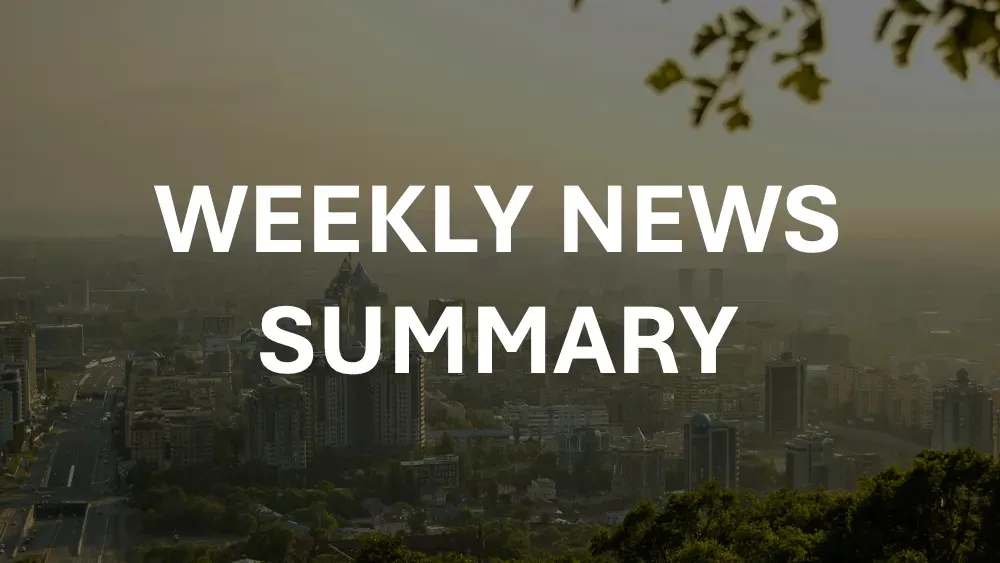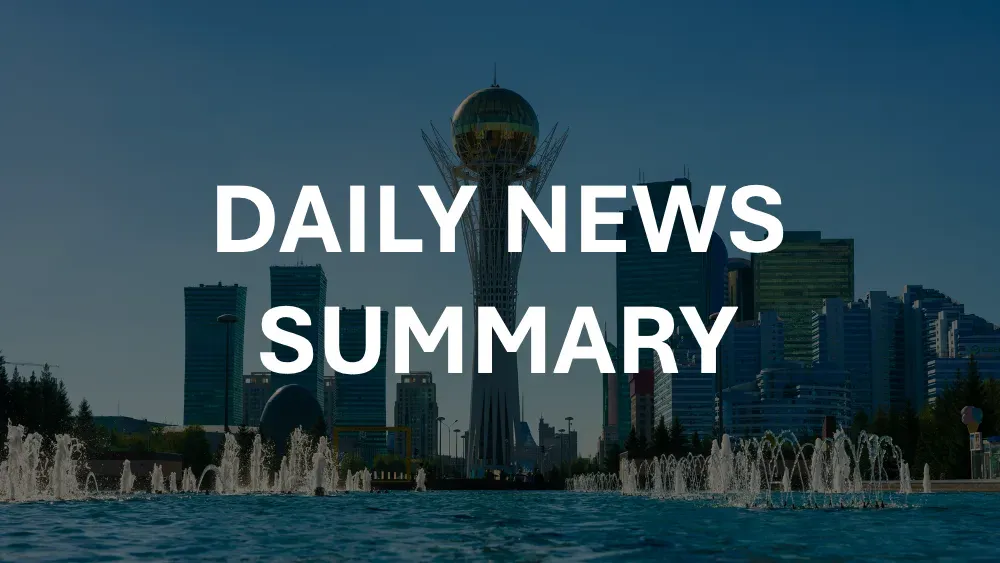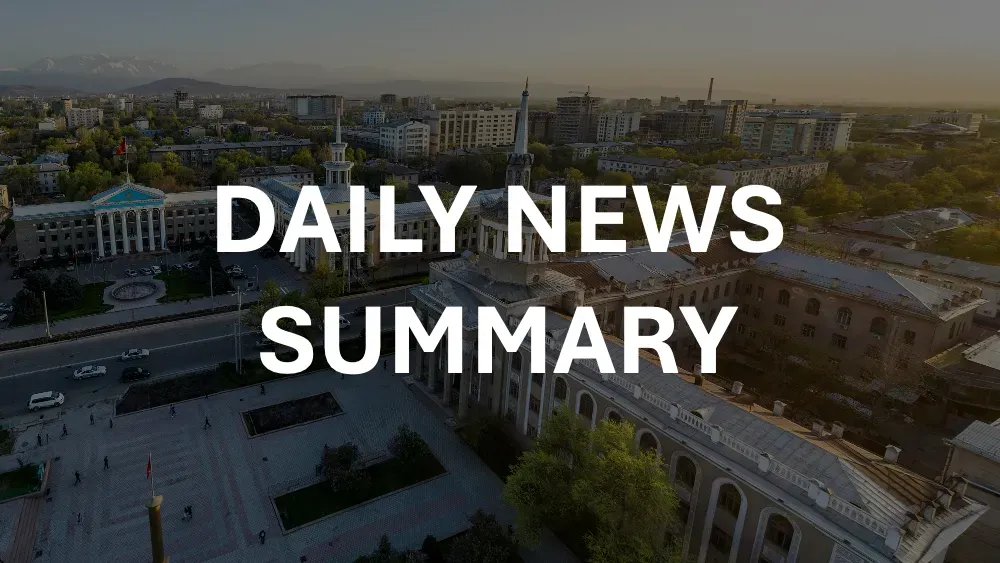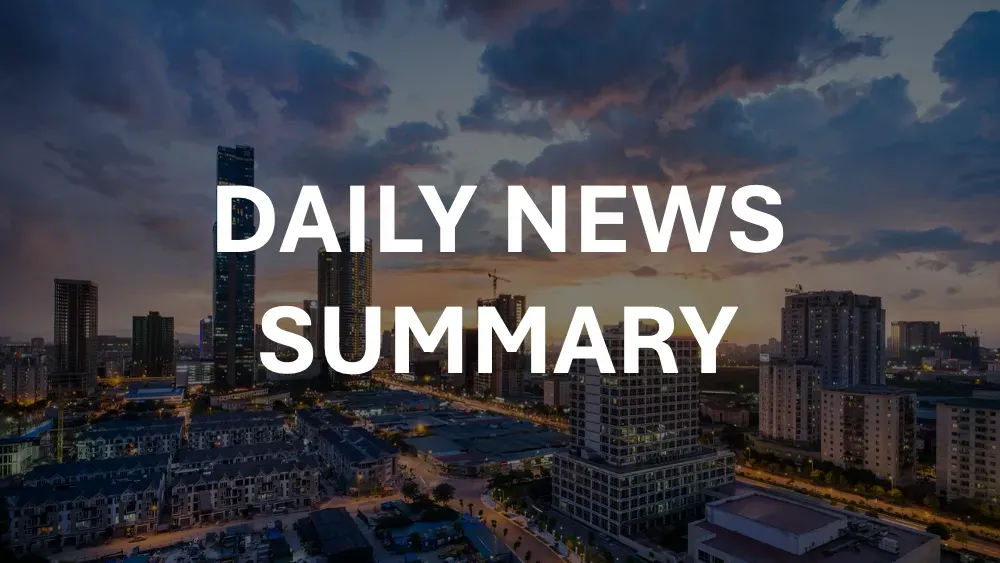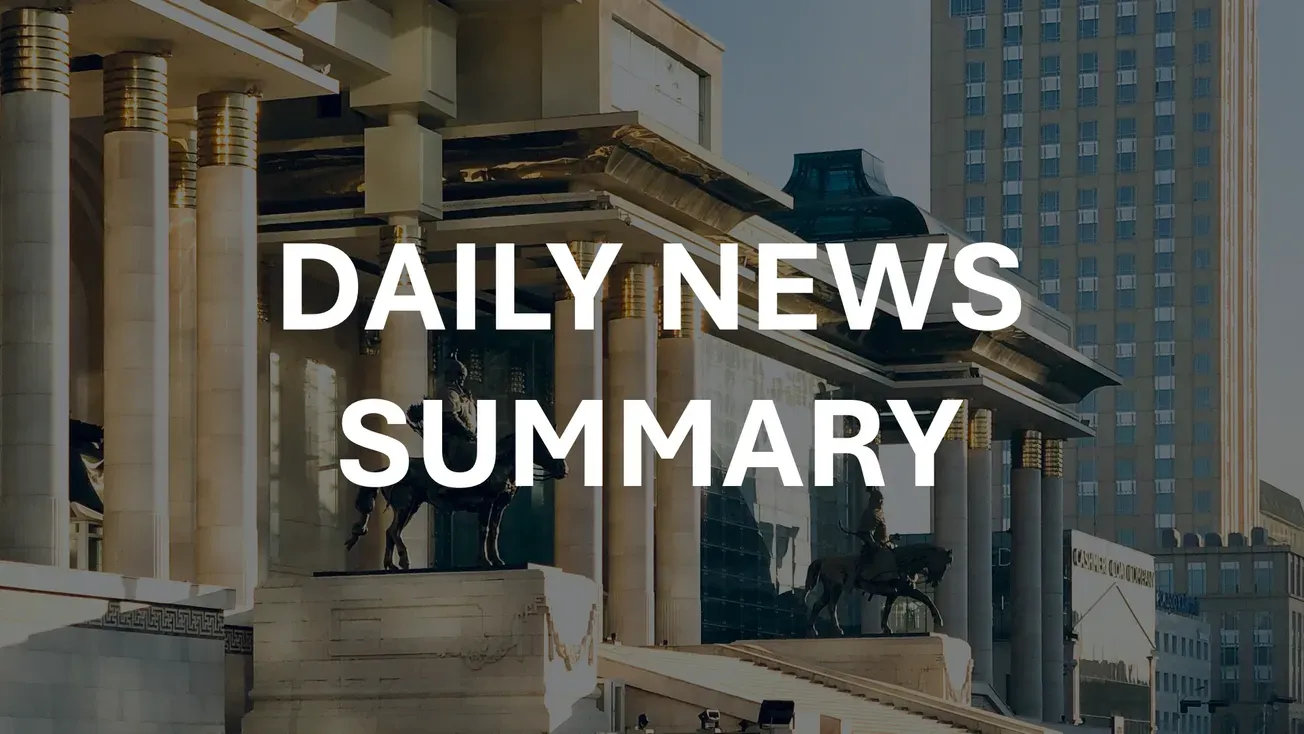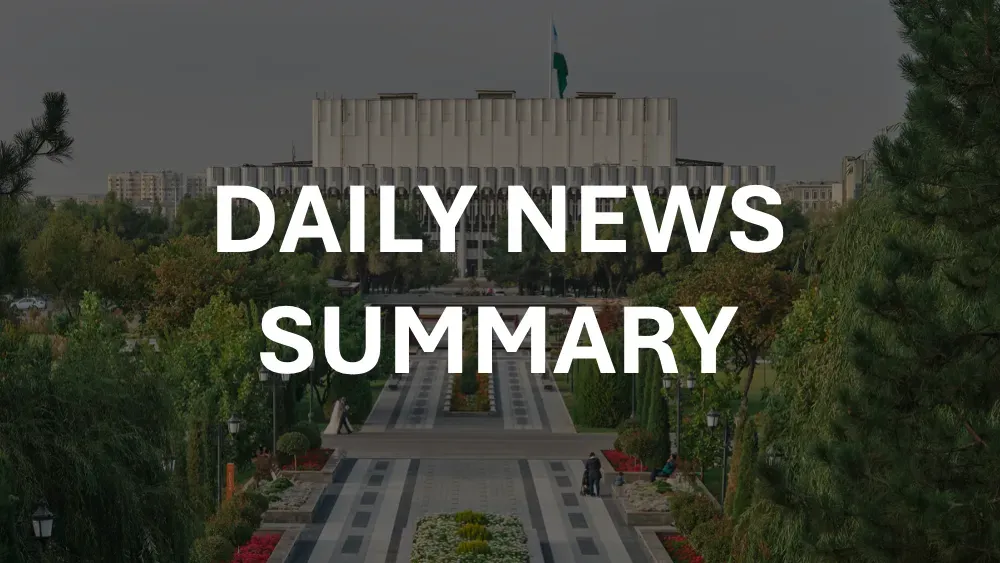This weekly digest showcases just 10 stories. Daily subscribers receive comprehensive intelligence briefs with 40 of the top stories organized by category. Don't miss the stories that matter.
Subscribe to Daily →
October 10, 2025 to October 16, 2025
This week's top 10 stories from Kazakhstan, selected from our daily intelligence briefs.
1. U.S. Floats 100% Tariffs on Chinese Goods, Raising Energy and Investment Risks for Central Asia
U.S. President Donald Trump has proposed doubling tariffs on Chinese imports to 100% and tightening export controls, a move Kazakh analysts warn could reverberate through Central Asia by weakening Chinese industrial demand and energy prices. Economist Arman Beissembayev told inform.kz that sharply higher U.S. duties would depress U.S. demand for Chinese goods, potentially slowing Chinese factory activity and cutting commodity needs—including oil and gas—thereby risking lower global prices and pressure on Kazakhstan’s oil-dependent budget.
Finance analyst Rasul Rysmambetov said the measure appears aimed at leveraging talks over China’s rare-earth export controls that affect U.S. defense supply chains; he judged direct effects on Kazakhstan limited because its U.S.-bound exports are mainly strategic raw materials. However, Rysmambetov cautioned that Kazakhstan could face downside risks from reduced Chinese outbound investment and the possibility of secondary sanctions or tariffs if it becomes a conduit for re-exports intended to bypass U.S. rules.
Local Coverage: inform.kz
From daily brief: 2025-10-15
2. Tax Regime Overhaul Aims to Curb Shadow Turnover and Cut Excess Intermediaries
Kazakhstan’s National Economy Ministry, led in statement by First Vice Minister Azamat Amrin, is reassessing how special tax regimes are applied across all sectors to curb shadow turnover and eliminate excessive intermediary chains. The review targets structural inefficiencies that enable undeclared transactions and higher supply-chain costs, and signals possible revisions to preferential tax treatments and compliance procedures affecting small and medium enterprises that use simplified regimes.
For international businesses and professional advisors, the recalibration could alter cash-flow planning, pricing and contractual arrangements with agents and distributors and may tighten oversight and incentives for formalization. Officials indicated a comprehensive, cross‑ministerial approach with phased implementation to preserve administrative capacity, though specific timelines and regulatory details have not yet been announced.
Local Coverage: inform.kz
From daily brief: 2025-10-10
3. Utility Tariff Hikes Drive Inflation to 25‑Month High, Pressuring Household and Production Costs
Annual inflation in Kazakhstan jumped to 12.9% in September — a 25‑month high — driven chiefly by steep regulated utility increases under the “Tariff for Investment” policy and rises in paid services. Housing services, water, electricity, gas and other fuels rose 17.4% on average (cold water +84.3%, gas distribution +28.3%, electricity +17.7%), contributing 1.9 percentage points to headline inflation; food inflation reached 12.7% with meat, dairy and oils hardest hit. Analysts attribute the surge largely to non‑monetary factors — tariff policy, domestic harvest shortfalls, high import dependence, a weaker tenge and elevated global food prices — noting Kazakhstan’s food prices have more than doubled (+110% since late 2019 to Aug 2025) and that inflation now outpaces regional peers.
Implications: the tariff‑driven spike is transmitting cost‑push pressures across production and logistics, raising operating costs for businesses and likely shifting consumer demand to cheaper alternatives, while limiting the effectiveness of credit and marketplace interventions. For policymakers the data underscore urgent need for targeted anti‑inflation and food‑market stabilization measures rather than broad monetary responses, given the prominence of administered price changes and supply constraints.
Local Coverage: dknews.kz, zakon.kz
From daily briefs: 2025-10-11, 2025-10-14
4. President Orders Action Plan to Steer Economic Reforms and Stabilize Economy
President Kassym-Jomart Tokayev has ordered Prime Minister Olzhas Bektenov to deliver, by the end of this week, a concrete action plan to accelerate the government’s economic reform program with adjustments aimed at stabilizing the economy, supporting SMEs and improving the investment climate. The directive emphasizes tighter coordination and a results-focused approach — prioritizing measurable mechanisms that align reforms with global market dynamics — and positions the plan as a roadmap to diversify the economy, strengthen non‑commodity sectors, and reinforce financial stability and business activity.
Presidential Press Secretary Ruslan Zheldibay framed the measures as necessary to support small and medium-sized businesses and to align policy parameters with Kazakhstan’s strategic interests and current market conditions. For international professionals, the move signals a near-term push for policy clarity and implementation — with concrete deliverables due within days — that could affect investment sentiment, sector allocation and risks tied to the country’s transition away from commodity dependence.
Local Coverage: informburo.kz, inform.kz, zakon.kz, aikyn.kz, egemen.kz, dknews.kz
From daily brief: 2025-10-17
5. New Banking Law Opens Market to Smaller Lenders and Islamic Finance Expansion
A draft “On Banks” law, due for adoption by year-end, would introduce basic and universal banking licenses to lower entry barriers for small and mid-sized lenders and intensify competition in the financial sector. The 9‑section, 23‑chapter, 135‑article bill also narrows state support for failing banks to only systemically important institutions—shifting losses to shareholders for other failures—and strengthens consumer protection measures, according to the Agency for Regulation and Development of the Financial Market.
The draft further permits universal banks to open Islamic banking windows, expanding Sharia‑compliant lending options and potentially broadening financial inclusion for religiously observant clients. Regulators and policymakers (Olzhas Kizatov, Deputy Chair) frame the reforms as aimed at increasing the number of banks and improving access to products for individuals and businesses, while recalibrating fiscal risk by limiting state bailouts.
Local Coverage: aikyn.kz
From daily brief: 2025-10-14
6. Lending Tightens after Central Bank Hikes Base Rate to 18%
Kazakhstan’s National Bank raised the base rate to 18% (±1 pp) on [decision reported in October 2025], citing accelerating inflation that hit 12.9% year‑on‑year in September and monthly inflation of 1.1%. Governor Timur Suleimenov warned further hikes are possible if disinflation stalls; the bank said tighter policy, FX operations and prudential measures aim to stabilise prices, support tenge assets and curb demand-driven inflation amid 6.5% GDP growth in Jan–Aug.
The hike has immediate market effects: money‑market TONIA rose to 15.7%, central bank open positions fell from KZT7tn to KZT5.5tn, and tighter reserve rules removed ~KZT1.5tn liquidity. Banks are reported to have paused or restricted mortgages as they reassess pricing and risk, with mortgages expected to move toward 24–25% and consumer loans near 40%; corporate lending and bond issuance costs have also risen. Analysts see year‑end inflation at 12–13% and USD/KZT around 550, with a 12–18 month transmission lag before full policy effects materialise.
Local Coverage: zakon.kz, aikyn.kz, egemen.kz, inform.kz, dknews.kz, informburo.kz
From daily briefs: 2025-10-11, 2025-10-12, 2025-10-13, 2025-10-15, 2025-10-16
7. Authorities Dismantle 130 Illegal Crypto Exchanges Used for Money Laundering
Kazakhstan’s Financial Monitoring Agency announced the shutdown of 130 unlicensed crypto exchange platforms it says were used to launder proceeds from online fraud and narcotics trafficking, and froze 16.7 million USDT during the investigations, local reports say. Authorities described a laundering chain that routed proceeds into bank accounts or crypto wallets tied to exchange services, used layered conversions and “dropper” cards/wallets to obscure origins, then cashed out or transferred funds abroad; the agency warned users to transact only with AIFC‑licensed providers and noted criminal liability for involvement in illicit schemes.
The enforcement action highlights intensified regulatory scrutiny of Kazakhstan’s crypto market as policymakers work to formalize compliant infrastructure: the National Bank is developing a crypto‑reserve concept aimed at managing systemic risk. For international professionals, the operation signals both stronger on‑the‑ground AML enforcement in a key regional crypto hub and imminent regulatory changes that could affect cross‑border crypto services and correspondent banking risk assessments.
Local Coverage: inform.kz, malim.kz, zakon.kz, dknews.kz
From daily brief: 2025-10-16
8. Central Bank to Regulate Tenge-Pegged Stablecoins with Full 1:1 Fiat Backing
Kazakhstan’s National Bank announced it will regulate tenge-pegged stablecoins, requiring full 1:1 backing in tenge and operation within a supervisory sandbox to ensure convertibility and price stability. The framework will place compliance and capital backing obligations on financial institutions and crypto service providers, with implications for liquidity management, settlement, and integration with existing payment rails and e‑commerce platforms.
Officials, including innovation expert Bakhyt Smekenov, signalled rising market interest as domestic fintech expands and cross-border use cases develop; the move is framed as part of broader financial modernization and could enable interoperable digital instruments and future synergies with a potential CBDC. The timeline for implementation was not specified.
Local Coverage: inform.kz, inform.kz, inform.kz, inform.kz
From daily brief: 2025-10-11
9. Eurobond Sale Draws Heavy Demand as KASE Eases Primary Market Settlement
Kazakhstan’s Finance Ministry sold $2.5 billion of eurobonds in a two-tranche transaction—$1.35 billion due in seven years at a 5.0% coupon and $1.15 billion due in 12 years at 5.5%—to refinance maturing debt, drawing roughly 2x oversubscription from investors across Europe, the U.S., Asia and the Middle East after a London roadshow to 180 investors. The coupons were described as among the lowest for peers with similar ratings, underscoring strong external demand and favorable funding conditions for the sovereign.
Simultaneously, the Kazakhstan Stock Exchange (KASE) and the Central Securities Depository implemented a central counterparty-based “single limit” mechanism that allows primary-market bids without pre-blocking cash while guaranteeing settlement and speeding local custody. Market participants (KASE’s Aziza Ordabayeva, Halyk Finance’s Roman Asilbekov and Alatau City Invest’s Anatoly Stroganov) said the change should lower settlement-failure risk, improve access for local investors and bolster secondary eurobond liquidity on KASE, marking a structural step toward a more modern, flexible capital market.
Local Coverage: egemen.kz
From daily brief: 2025-10-14
10. Astana Pushes East Branch of North–South Corridor with Joint Investment Program and New Eurasian Council
Kazakh President Kassym-Jomart Tokayev has proposed a joint investment and infrastructure program with Russia and Turkmenistan to accelerate the East branch of the International North–South Transport Corridor, seeking backing from international financial institutions. The plan aims to lay more than 5,000 km of new rail and rehabilitate 11,000 km of roads by 2030, expand the Kyzylorda–Russia highway to four lanes, and multiply current East-branch throughput (about 2.5 million tonnes in 2024) by 2027.
Tokayev also proposed creating a Eurasian council of transport ministers, experts and business to steer corridor development and highlighted the Afghanistan–South Asia route as commercially promising. Kazakh and Russian agencies will discuss the joint program ahead of Tokayev’s planned visit to Moscow on 12 November, signaling a coordinated push to unlock the corridor’s trade potential and attract international financing.
Local Coverage: aikyn.kz, inform.kz, zakon.kz
From daily brief: 2025-10-10
About This Weekly Digest
The stories above represent the most significant developments from Kazakhstan this week, selected through our AI-powered analysis of hundreds of local news articles.
Stories are drawn from our daily intelligence briefs, which synthesize reporting from Kazakhstan's leading news sources to provide comprehensive situational awareness for international decision-makers.
These weekly highlights are a small sample of what's happening. Daily subscribers get comprehensive briefings with 40 top stories that connect the dots between events, track developing stories, and provide the context you need for informed decision-making.
Upgrade to Daily →
